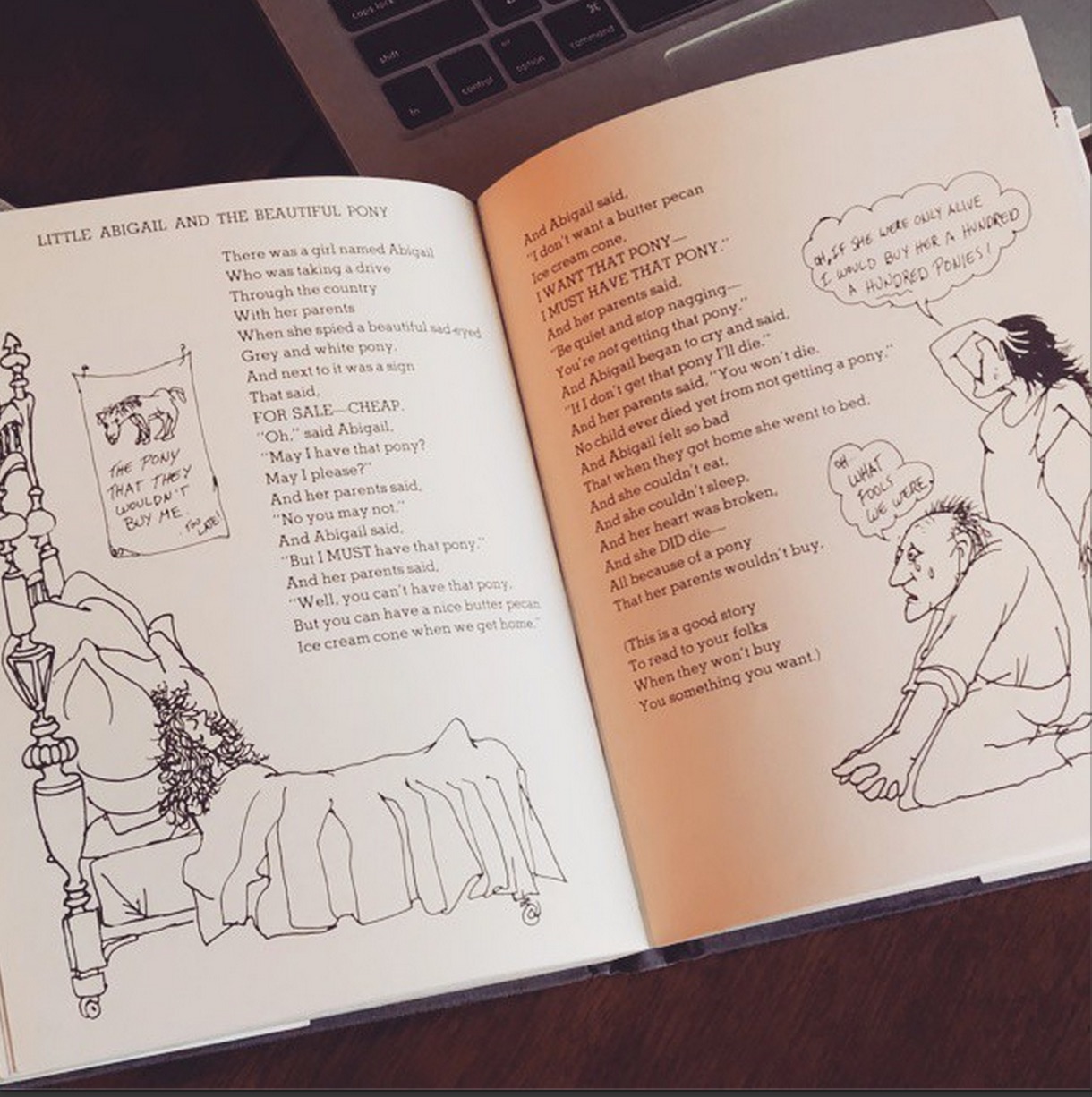Lament: Brought to Speech (Psalm 13)
What is Lament?
In January for the past 4 or 5 years we’ve participated in Peace Month with other churches from our Yearly Meeting. This January our focus is Lament and peace. We are going to talk about personal lament, communal lament, and more.
You may wonder the connection between these two. What does lament have to do with peace?
But before we get there I want us to explore what is lament?
Q: What are some words that come to mind for you when you think of lament?
I want to start today with one of our favorite Shel Silverstein poems:

Little Abigail and the Beautiful Pony
There was a girl named Abigail
Who was taking a drive
Through the country
With her parents
When she spied a beautiful sad-eyed
Grey and white pony.
And next to it was a sign
That said,
FOR SALE—CHEAP.
“Oh,” said Abigail,
“May I have that pony?
May I please?”
And her parents said,
“No you may not.”
And Abigail said,
“But I MUST have that pony.”
And her parents said,
“Well, you can have a nice butter pecan
Ice cream cone when we get home.”
And Abigail said,
“I don’t want a butter pecan
Ice cream cone,
I WANT THAT PONY—
I MUST HAVE THAT PONY.”
And her parents said,
“Be quiet and stop nagging—
You’re not getting that pony.”
And Abigail began to cry and said,
“If I don’t get that pony I’ll die.”
And her parents said, “You won’t die.
No child ever died yet from not getting a pony.”
And Abigail felt so bad
That when she got home she went to bed,
And she couldn’t eat,
And she couldn’t sleep,
And her heart was broken,
And she DID die—
All because of a pony
That her parents wouldn’t buy.
Authors Note:
(This is a good story
To read to your folks
When they won’t buy
You something you want.)
What is going on in this poem?
Do you think it is true and authentic lament?
As I am learning about Lament this is what I know so far.
Lament is not you saying “that’s not fair” and it is not about being upset that you didn’t get your own way.
When your neighbor is able to get that fancy boat that you’re not able to have and you feel that’s really unfair, that’s not lament. It’s not about your older brother getting two chocolates when you only get one. It’s not about good luck or bad luck. Lament is not about those very overplayed complaints, “I’m so sick and tired of this person or that person, always getting what they want…” or angrily speaking to the manager after someone messed up your dinner bill. All of this sucks and it’s not fair, but I’m pretty sure these don’t fall under the category of lament.
Lament is the opposite of being fair-weather.
Lament is not self-pitying. It is not about throwing our hands up when things don’t turn out the way we wanted them to and so we’re just going to die now. Now that things aren’t going to go your way you might as well just give up and throw in the towel.
Finally, lament fixes blame towards God and not others.
This is a bit shocking is it? Those who lament will not be heard finding fault with others. In fact, rarely is a it focused on personal guilt. Those who lament will not be those looking to place responsibility elsewhere – they fix it on God. This is a situation that only God can change, and so through persistence we will continue to approach God until circumstances change or we are changed.
Lament is…? – Psalm 13

Lament, as Walter Brueggemann says, is about “Calling attention to reality of human loss. It is a given that needs to be processed theologically.”
Lament is prayers and emotions that express deep loss, deep disconnect from how things ought to be and the reality of things are. Lament is protest, it can be expressed in anger, or desperation as we will see. Lament is like a deep and emotional groan that becomes prayer to God.
In order to understand lament better, let’s look at a contrasting poem in Psalm 13.
Remember that the book of Psalms is the prayer book of the Bible. Quakers aren’t particularly great at using written prayers but these Psalms “praises” have been being used as prayers for thousands of years. They are collected here as prayers that we can use for ourselves.
I think this is especially helpful when we don’t know how to pray, or what kind of words to say to God. We can turn to the Psalms and begin to steep in these “praises” which, once you start reading them, aren’t all praises.
Henri Nouwen has said that these Psalms of lament are,
“For those who cannot articulate their own pain.”
In other words: here is a tool for deeper spirituality right here. Learn, pray, read, meditate on the Psalms. Take them and pray them verbatim or put them into your own words.
Let’s Read Psalm 13, our first Psalm of Lament, again.
Q: What are some of the things you notice right off the bat?
Q: Do you see any patterns or developments as the poem progresses?
People call Psalm 13 a Psalm of disorientation or a Psalm of darkness.
Those who understand Psalms of disorientation better than me suggest that there is a basic framework to these we can discern. (This same structure is taken from Brueggemann’s “Message of the Psalms” p.58–60).
A. Questions (v. 1–2)
(1-2) How long, O LORD? Will you forget me forever? How long will you hide your face from me? How long must I bear pain in my soul, and have sorrow in my heart all day long? How long shall my enemy be exalted over me?
There are 4–5 rhetorical questions here. God is put on trial. This is where we see the blame or the address made directly to God. The Psalmist here is not interested in having anyone explain what is going on or give any excuses. The Psalmist is only interested in questioning God for what is going on.
There are two major problems the Psalmist has with God:
- Absence of God
- My enemies prevail
For the Psalmist, there is something amiss in the relationship and the injustice, the brokenness drives his request into what Brueggemann calls “Bold Faith.” The accusatory language of this prayer may feel weird or unnatural but within the Hebrew tradition this is what the practice of lament looks like. Nothing is off limits. No prayer is inappropriate to God. To bring all your pain, your complaints, your nice prayers and the ugly ones are all a part of having a “bold faith.”
It is bold because it refuses to live in a pretend reality. It faces squarely into the darkness and disorientation of life. And it declares that this darkness, especially our darkness, must be put into conversation with God. Nothing should be held back from God.
everything must be brought to speech, and everything brought to speech must be addressed to God, who is the final reference for all of life” (The Message of the Psalms, 52).
B. Beyond Coping (v. 3–4)
(3-4) Consider and answer me, O LORD my God! Give light to my eyes, or I will sleep the sleep of death, and my enemy will say, “I have prevailed”; my foes will rejoice because I am shaken.
The Psalmist is beyond coping. He is at his wit’s end. There are no more explanations, not more resources, no more excuses that can be given. But he refuses to give up.
He too, like Abigail, is about to die.
I sympathize with the prayer’s author because he stands in that in between life and death; where there is a teetering on just making it and completely losing himself. I feel as though I have no place left to stand.
“Give light to my eyes, or I will sleep the sleep of death.”
This truly is disorientation.
In Nicholas Wolterstorff’s book “Lament for a Son” he describes this in-between well:
But the pain of the no more outweighs the gratitude of the once was.
He knows the in-between and describes it well when he receives a call about the death of his son:
“The call came at 3:30 on that Sunday afternoon, a bright sunny day. We had just sent a younger brother off to the plane to be with him for the summer.
”Mr. Wolterstorff?“
”Yes.“
”Is this Eric’s father?“
”Yes.“
Mr. Wolterstorff, I must give you some bad news.”
“Yes.”
“Eric has been climbing in the mountains and has had an accident.”
“Yes.”
“Eric has had a serious accident.”
“Yes.”
“Mr. Wolterstorff, I must tell you , Eric is dead. Mr. Wolderstorff, are you there? You must come at once. Mr. Wolterstorff, Eric is dead.”
“For three seconds I felt the peace of resignation: arms extended, limp son in hand, peacefully offering him to someone – Somone. Then the pain – cold burning pain.”
Our lament is like telephone call, the juncture between two great distances. We know it is true lament when we are beyond coping and we know that we are on the brink of life or death.
C. Waiting
And then the Psalmist waits. We don’t know for how long. But we know that he waits in the darkness. He becomes oriented with disorientation and stays there.
D. New Orientation (v 5)
(5-6) But I trusted in your steadfast love; my heart shall rejoice in your salvation. I will sing to the LORD, because he has dealt bountifully with me.
And after so prolonged period of time he finds resolution in the lovingkindness of God. This is not some trite “everything works out to the good” because we know there are plenty of stories that never get told and plenty of endings that never end in a complete sentence or a period.
Instead, for the one who is transformed through lament, light comes to their eyes and they come to understand that “Nothing Shall Separate us from the Love of God.”
…Neither death, nor life, nor angels, nor rulers, nor things present, nor things to come, nor powers, nor height, nor depth, nor anything else in all creation, will be able to separate us from the love of God in Christ Jesus our Lord.” (Romans 8:37–39 NRSV)
Brought to Speech
The important thing about Lament is that our suffering, our darkness, and disorientation is “brought to speech” in relationship with God. There is nothing you experience, no pain too deep, no sense of loss so tragic that you ought not to just take it to God but to make it God’s business to transform the situation.
All of our lives must be brought into dialogue with the lovingkindness of God if we are to be transformed. Even if the circumstances are irreversible, that does not mean we cannot find a new orientation by practicing this bold kind of faith.
The Psalmist knows that one option really is death, literal, spiritual or emotional death. These are always live options for us too. And to remain silent is to allow that death to creep in. It is to wall God off and and forego the change that is possible.
“Everything is awesome” is the theme song not just of the lego movie but of all who live comfortably in America. To practice lament is to challenge this. It is to refuse to pretend and instead face reality squarely. To voice our disorientation. To address God fully. To pour out the depths of our hearts and to await transformation because we trust that God’s lovingkindness is the final reference for all of life.
Flickr credit for Weeping Angel – Link